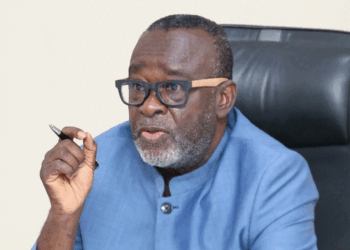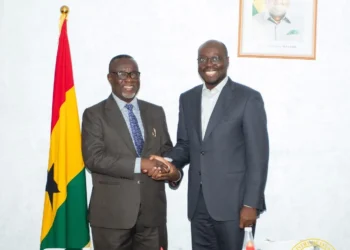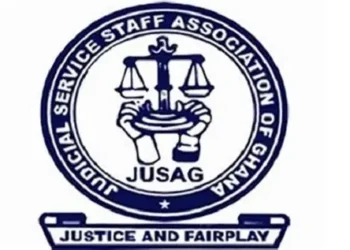The EXTON cubic case is one that generated a lot of public political interest because of its perceived association with Mr. Ibrahim Mahama the brother of the then former president John Mahama who now is the president of Ghana.
The discourse around the case then was fueled by a lot of politically skewed propaganda aimed at achieving a certain public reaction and garner support for the actions to be taken by the president Akufo Addo’s government.
The propaganda included stories such as, President Mahama has handed over all of Ghana’s bauxite to his brother Ibrahim Mahama. Interestingly, and without any scintilla of evidence, the then Deputy Attorney General. ( Godfred Dame) a man with a hero complex, filed processes in court and reiterated this narrative without attaching any document to support the claim that the concession given to Exton cubic was all of Ghana’s bauxite reserve.
Subsequently, and in accordance with the well orchestrated plan to use political might to take away the concessions from Exton Cubic, the then Minister for lands and natural resources ( Hon. Peter Amewu) revoked the leases. The revocation of the leases ended the State and Exton in Court.
The legal battle between Exton and Ghana continued all the way to the Supreme Court for a final determination of the legal issues.
In the Court the cardinal argument of the NPP government was that, the leases were invalid because they had not been ratified by parliament as required by the constitution. At page 3 of the decision in the said case delivered on 31st July 2019, the Supreme Court in the first paragraph of the said page summed up the thrust of the Applicant’s (the then Attorney General) case as follows;
“Indeed, the main thrust of the applicant’s case, is that the three leases granted to the interested party violated article 268(1) of the constitution, as the leases had not been ratified Parliament”
Yes, then Constitution requires that every mining agreement entered into by the government is ratified by Parliament before it becomes valid and enforceable. However, the understanding of ratification had always been that, it occurs after the fact, so a lease pending ratification could not be void when the last in the sequence of things is yet to be done. Article 268(1) of the constitution provides as follows:
“Any transaction, contract or undertaking involving the grant of a right or concession by or on behalf of any person including the Government of Ghana to any other person or body of persons howsoever described, for the exploitation of any mineral, water or other natural resource of Ghana made or entered into after the coming into force of this Constitution shall be subject to ratification by Parliament.”
Exton cubic argued against the position taken by the AG and argued that, acquisition of a mining lease was in stages and that ratification of the lease was the last stage hence the fact that the leases were yet to be ratified did not violate article 268(1) of the constitution. Exton further argued that the mining leases must be in existence before it could be ratified. Hence, the argument that the leases which precedes the parliamentary ratification violated the constitution because they had not been ratified was an untenable argument. But the Court rejected that argument.
Clearly, from the above quoted portion of the decision, the Court took the view that the pivot of the Exton cubic case rested on whether or not the leases which had not been ratified by Parliament violated article 268(1) of the constitution.
After analyzing the relevant constitutional provisions especially articles 257(6) and article 268(1), the Supreme Court on pages 12-13 of the decision held that, a mining lease which has not been ratified parliament is invalid. The Court held as follows:
“Now, the question we need to address is whether or not, the High Court in the application before it did enforce a non -existent right. We can only answer this question upon a careful examination of the relevant provisions of the Constitution and the Minerals and Mining Act, Act 703. In this regard, we will start our examination from article 257(6) of the Constitution which provides as follows: –
“257 (6). Every mineral in its natural state in, under or upon any land in Ghana, rivers, streams, water courses throughout Ghana, the exclusive economic zone and any area covered by the territorial sea or continental shelf is the property of the Republic of Ghana and shall be vested in the President on behalf of and in trust for the people of Ghana.
The above provision is very clear and our understanding of it is that, every mineral found in Ghana is for the Republic as a whole and the President holds the mineral in trust for the people of Ghana, whose representatives are in Parliament. The Constitutional provision in article 268 that such mining leases shall be subject to Parliamentary ratification derive its source and wisdom from article 257 (6). It was for a good reason that the framers of our Constitution provided that the people of Ghana, who are the owners of the minerals found in Ghana, had a voice in any contract or undertaking involving the grant of any such mineral, through their representatives in Parliament. The reason is that the President on whose behalf the Minister for Land and Natural Resources acts is only a trustee of the mineral.
Article 268 (1) of the Constitution then provides thus: –
“Any transaction, contract or undertaking involving the grant of a right or concession by or on behalf of any person including the Government of Ghana, to any other person or body of persons howsoever described, for the exploitation of any mineral, water or other natural resource of Ghana made or entered into after the coming into force of this Constitution shall be subject to ratification by Parliament.”
The intention of subjecting any transaction involving the exploitation of any mineral to Parliamentary ratification, was to ensure that such transaction had received the approval of the actual owners of the mineral, the people of Ghana, such approval expressed through their representatives in Parliament as engineered by the Constitution.
We wonder the essence of article 268 (1) in the Constitution, if it was not intended that, mining leases shall only become valid upon Parliamentary ratification. We are of the considered opinion, therefore, that without Parliamentary ratification a mineral lease granted by the Executive arm of Government shall be invalid. In other words, we hold that pursuant to article 268 (1) every mineral lease granted pursuant to the Minerals and Mining Act, Act 703, requires the ratification of Parliament to be valid.”.
The Supreme Court in the above referenced case, was very categorical that, without Parliamentary ratification a mineral lease granted by the Executive arm of Government shall be invalid.
The net effect of this decision is that, a holder of mining agreement or lease which has not been ratified by Parliament, cannot claim any right under it and such a lease is invalid in law. Effectively, the holder of a mining lease which has not been ratified, has no right to carry out any operations on the concession or undertake any mining activity on the concession since that mining lease is invalid in the face of the constitution.
As fate will have it, the records available now shows that, the NPP which was the main architect of the grand scheme to oust Exton cubic from Nyinahin, at the time of leaving office, had executed over 20 mining agreements, none of which had received parliamentary ratification. These leases includes the bauxite concession for Rocksure International ltd and a concession for Newmont Ghana.
Now, in the light of the binding force of the Supreme Court decision in Exton Cubic, it is beyond any debate that the leases purported to be held by the affected persons are invalid and confers no right or obligation.
It appears now, more than ever that the NPP is about to be given a dose of the bitter pill they gave Exton Cubic and from all indications, the NPP and the persons who obtained the leases under the NPP do not or will not like the taste of the pill.
The sector minister has a constitutional duty to apply the laws of Ghana so he should as a matter of urgency, issue a directive to all holders of mining leases obtained under the NPP which have not been ratified by Parliament to cease, desist and vacate the mining concessions with immediate effect to avoid arrest and prosecution for illegal mining activities or operations.
The Akan saying “sɛ wo we ɔfoɔ nsa a, na w’ahwɛ wo nsa” brilliantly sums up the unpalatable consequences left behind by the NPP and the Supreme Court in their handling of the Exton cubic case.
Happy Easter
Author : Nuna Kpodo ( law student)





































